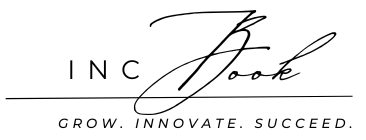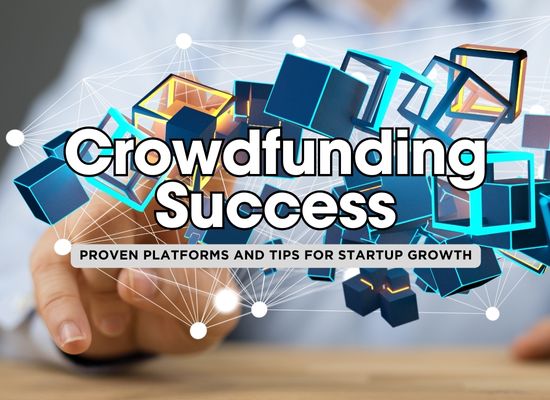The landscape of startup funding has undergone a massive transformation, with crowdsourced investment platforms emerging as a crucial option for entrepreneurs to connect with individual investors. These platforms democratize the funding process, offering an alternative to traditional venture capital and opening the door to a more diverse set of investors. Whether you’re a startup founder looking to raise capital or an investor looking to diversify your portfolio, understanding these platforms is essential for success.
🎯 Check here for Top Business Financing Options
1️⃣ Kickstarter 🚀
Overview:
Kickstarter has long been a household name in the crowdfunding world, particularly for creative projects. In 2025, it continues to lead the pack, providing startups with the opportunity to tap into a global network of backers. The platform is primarily reward-based, meaning backers receive perks or products in exchange for their contributions, rather than equity in the company. This makes it ideal for consumer goods, tech gadgets, or innovative designs, as people are willing to fund projects they’re passionate about without expecting ownership.
Why It’s Great for Startups:
- Large Community: Kickstarter has over 20 million users, providing startups with an extensive reach.
- Proven Success: Many successful startups, like Pebble and Oculus, have used Kickstarter to fund their initial development stages.
- Flexibility: Startups can offer rewards at various tiers, allowing for creativity in how they engage their audience.
- Global Exposure: Being one of the most recognized crowdfunding platforms worldwide, startups gain access to a broad, international audience.
What to Keep in Mind:
- All-or-Nothing Funding: Kickstarter operates on an all-or-nothing funding model. If a campaign doesn’t meet its funding goal, the project doesn’t receive any funds.
- Heavy Competition: The platform hosts thousands of projects, so standing out can be challenging without a strong marketing effort.
Website Link: Kickstarter
2️⃣ Indiegogo 🌍
Overview:
Indiegogo is another titan in the world of crowdsourced funding. While similar to Kickstarter in its focus on creative projects, Indiegogo offers more flexibility in terms of funding models, making it a great choice for startups across a variety of industries. Indiegogo supports both flexible and fixed funding, which means startups can keep funds raised even if they don’t meet their goal—offering an edge over the all-or-nothing model that Kickstarter uses.
Why It’s Great for Startups:
- Two Funding Models: Startups can choose between flexible funding (keep what you raise, even if it’s less than the goal) and fixed funding (all-or-nothing).
- Wide Reach: Indiegogo has a strong community of over 9 million users worldwide, including early adopters and tech enthusiasts.
- Global Marketplace: The platform allows startups to market and ship their products to over 200 countries, which is ideal for businesses with an international focus.
- Diverse Categories: While Indiegogo is known for tech and innovation, it supports projects in health, social causes, and even personal finance.
What to Keep in Mind:
- Fee Structure: Indiegogo charges a platform fee of 5%, and if you choose the fixed funding model, you’ll be required to pay an additional 3-5% payment processing fee.
- Marketing Required: To stand out and meet your funding goals, a strong marketing campaign is essential. Indiegogo doesn’t offer much in the way of organic promotion.
Website Link: Indiegogo
3️⃣ Patreon 💡
Overview:
Patreon provides a unique model for funding creative projects and startups through membership-based support. Rather than offering rewards for one-time contributions, Patreon allows creators and entrepreneurs to build a continuous stream of funding by offering exclusive content, perks, and experiences to their supporters. This model works particularly well for businesses with a loyal community, such as content creators, educators, or startups offering niche products or services.
Why It’s Great for Startups:
- Ongoing Support: Patreon allows for continuous, recurring income from subscribers, providing a reliable revenue stream.
- Flexible Rewards: Startups can offer a variety of content tiers and rewards, from early access to products to behind-the-scenes content.
- Strong Community Focus: It works particularly well for businesses with a strong, engaged following or niche market.
- Global Reach: With users from all over the world, Patreon gives businesses the ability to scale and engage customers globally.
What to Keep in Mind:
- Fees: Patreon takes a 5% to 12% fee on the funds raised, depending on the tier selected by the startup.
- Niche-Oriented: Best suited for businesses with a dedicated audience, as it may not attract support from those unfamiliar with the brand.
Website Link: Patreon
4️⃣ Seedrs 💼
Overview:
Seedrs is a leading equity crowdfunding platform that specializes in connecting startups with individual investors. With a focus on businesses looking to raise capital by offering equity (ownership shares), Seedrs has become one of the most popular crowdfunding options in Europe. It enables startups to raise funds from a wide pool of investors, ranging from seasoned venture capitalists to individual backers. This platform is particularly well-suited for high-growth startups in industries such as technology, healthcare, and sustainability.
Why It’s Great for Startups:
- Equity-Based Funding: Seedrs allows startups to offer equity in exchange for capital, making it attractive for businesses looking to share ownership.
- Regulated Platform: Seedrs is regulated by the UK’s Financial Conduct Authority (FCA), providing an added layer of trust and security for both investors and startups.
- Broad Investor Network: The platform has a large pool of investors, increasing the chances of securing funding.
- International Reach: Although primarily based in Europe, Seedrs offers cross-border investment opportunities, allowing startups to tap into global markets.
What to Keep in Mind:
- Fees: Seedrs charges a 7.5% fee on the funds raised (excluding VAT), and additional fees for legal and compliance services.
- Equity Dilution: Startups must be prepared to dilute their ownership stake in exchange for investment.
Website Link: Seedrs
5️⃣ Crowdcube 🌐
Overview:
Crowdcube is one of Europe’s leading equity crowdfunding platforms, offering startups the ability to raise capital by selling shares of their business to a large pool of investors. Crowdcube focuses on high-growth startups, including those in technology, consumer goods, and social impact. The platform is highly popular among both investors and startups because it allows businesses to reach new audiences and gain capital while offering investors a chance to share in the growth of innovative companies.
Why It’s Great for Startups:
- Equity Crowdfunding: Crowdcube allows businesses to raise funds by offering equity shares, which is ideal for scaling companies looking for substantial investments.
- Large Investor Network: The platform boasts a community of over 500,000 investors, including angel investors and venture capital firms.
- Strong Track Record: Crowdcube has successfully raised millions for startups, with numerous companies raising funds and achieving significant growth after their campaigns.
- International Reach: While it is based in the UK, Crowdcube allows international investors to back startups, providing a global funding pool.
What to Keep in Mind:
- Equity Dilution: As with any equity crowdfunding platform, startups need to be prepared to give up a percentage of ownership in exchange for funding.
- Fees: Crowdcube charges an upfront fee for campaign management and a success fee on funds raised, typically ranging from 7-10% depending on the amount raised.
Website Link: Crowdcube
6️⃣ Wefunder 💸
Overview:
Wefunder is an equity crowdfunding platform that allows anyone to invest in startups, not just accredited investors. This democratization of investment has made Wefunder a popular choice among entrepreneurs looking to raise capital from a broad pool of investors. With low minimum investments (starting as low as $100), Wefunder enables everyday people to invest in emerging companies, making it one of the most inclusive platforms available.
Why It’s Great for Startups:
- Inclusive Investment: Wefunder allows anyone to invest, making it accessible to both accredited and non-accredited investors.
- Low Minimum Investment: With investments starting as low as $100, it’s easy to get a large number of backers, helping startups reach their funding goals faster.
- Wide Range of Industries: While it started with a focus on tech and innovation, Wefunder supports startups across various sectors including healthcare, consumer products, and social impact.
- No Upfront Costs: Wefunder does not charge upfront fees to startups for setting up campaigns, making it a cost-effective option for raising funds.
What to Keep in Mind:
- Equity Dilution: As with other equity crowdfunding platforms, startups must offer equity in exchange for capital, which can lead to significant ownership dilution.
- Fee Structure: Wefunder charges a 7.5% success fee for funds raised, along with 3-5% in payment processing fees.
Website Link: Wefunder
🎯 Check here for Top Business Financing Options
7️⃣ StartEngine 🚀
Overview:
StartEngine is a leading equity crowdfunding platform that allows startups to raise capital by offering shares of their company to a large pool of investors. It stands out for its inclusive model, enabling both accredited and non-accredited investors to participate in funding opportunities. StartEngine provides startups with the tools they need to market their campaigns and engage a community of investors, making it an excellent option for businesses looking to gain traction and scale quickly.
Why It’s Great for Startups:
- Equity Crowdfunding: Startups can offer equity shares, allowing them to raise significant capital from a large group of investors.
- Wide Access for Investors: Both accredited and non-accredited investors can participate, expanding the pool of potential backers.
- Advanced Tools: The platform provides a range of marketing and analytics tools to help startups run successful campaigns and engage investors effectively.
- Venture-Backed: Many startups that have raised funds on StartEngine have gone on to achieve impressive growth and venture capital backing.
What to Keep in Mind:
- Equity Dilution: As with all equity crowdfunding platforms, startups must be prepared to give up ownership in exchange for capital.
- Fees: StartEngine charges a 7.5% success fee on the funds raised, along with additional fees for marketing and services.
Website Link: StartEngine
8️⃣ GoFundMe 💖
Overview:
GoFundMe is one of the most recognized crowdfunding platforms, traditionally focused on donation-based campaigns. While it’s most commonly used for personal causes, GoFundMe has increasingly been used by startups, particularly those with a social impact or community-driven mission. Entrepreneurs can use GoFundMe to raise funds for their business, particularly in the early stages, and engage their community of supporters to help them meet their goals.
Why It’s Great for Startups:
- Donation-Based: GoFundMe doesn’t require startups to offer equity or rewards; instead, they raise funds through donations, which makes it ideal for socially conscious businesses or those with a community-centered focus.
- No Platform Fees: GoFundMe does not charge platform fees on donations (though there are processing fees), making it a cost-effective choice for entrepreneurs.
- Global Reach: With millions of users worldwide, GoFundMe enables businesses to raise funds from a global pool of potential backers.
- Social Impact: It’s particularly well-suited for startups with a strong social or charitable element, allowing founders to build a supportive community around their mission.
What to Keep in Mind:
- Limited to Donations: Since it’s primarily donation-based, GoFundMe is not ideal for businesses looking to offer equity or rewards to backers.
- Campaign Marketing: While GoFundMe has a large user base, successful campaigns still require substantial effort in terms of marketing and engaging supporters.
Website Link: GoFundMe
9️⃣ Fundable 💼
Overview:
Fundable is an equity crowdfunding platform that helps startups raise capital by offering either equity or rewards to backers. It’s specifically designed for small businesses and startups, providing them with the tools they need to create compelling campaigns and connect with potential investors. Fundable has two main models: one for raising funds through equity offerings and another for launching rewards-based campaigns, giving startups flexibility in how they approach funding.
Why It’s Great for Startups:
- Equity and Rewards-Based Models: Startups can choose between raising funds through equity (offering shares of the business) or through rewards-based crowdfunding (offering products or services).
- Flexibility: The ability to choose between equity and rewards allows businesses to tailor their campaign strategy to their needs.
- All-or-Nothing: Fundable operates on an all-or-nothing model, so startups only receive funding if they meet their target goal, ensuring a higher level of commitment from backers.
- Comprehensive Support: Fundable provides startups with campaign tools and resources, helping them manage their fundraising efforts more effectively.
What to Keep in Mind:
- Campaign Fees: Fundable charges a platform fee of 3.5% on funds raised for equity-based campaigns, while rewards-based campaigns are subject to a monthly fee.
- Equity Dilution: If you opt for equity crowdfunding, you will need to offer ownership in exchange for investment.
Website Link: Fundable
🔟 Republic 🌍
Overview:
Republic is an equity crowdfunding platform that offers startups the chance to raise funds by offering equity to individual investors. Republic stands out due to its focus on democratizing investment opportunities, allowing both accredited and non-accredited investors to participate. The platform focuses on high-growth startups across various industries, including tech, real estate, and social impact, making it a great option for entrepreneurs looking for diverse backing.
Why It’s Great for Startups:
- Inclusive Investment: Republic allows non-accredited investors to participate in funding rounds, democratizing access to startup investments.
- Equity and Tokenized Crowdfunding: In addition to traditional equity, Republic also offers tokenized crowdfunding, allowing startups to issue digital tokens as part of their fundraising efforts.
- Diverse Investor Pool: The platform connects startups with a broad base of investors, including both traditional angel investors and a larger pool of individual backers.
- Strong Network: Republic has built a strong network of successful startups, with many companies raising significant funds and achieving rapid growth after campaigns.
What to Keep in Mind:
- Equity Dilution: Like all equity crowdfunding platforms, Republic requires startups to offer equity, meaning that founders will dilute ownership.
- Fees: Republic charges a 6% success fee on funds raised, along with additional fees for certain services such as legal and compliance.
Website Link: Republic
Here are the last two notable crowdsourced investment platforms:
1️⃣1️⃣ MicroVentures 💼
Overview:
MicroVentures is a unique crowdfunding platform that focuses on equity crowdfunding, allowing startups to raise capital by offering shares to a broad range of investors. What sets MicroVentures apart is its combination of both angel investing and crowdfunding, providing a hybrid approach to capital raising. This platform has a strong focus on high-growth tech startups and offers a professional, venture-backed approach to fundraising.
Why It’s Great for Startups:
- Hybrid Approach: MicroVentures combines the best of both angel investing and crowdfunding, giving startups access to professional investors alongside a broader public base.
- Tech-Focused: Ideal for tech startups, as it attracts investors interested in emerging technologies, software, and innovative products.
- Experienced Network: Startups can benefit from access to a network of experienced investors, including angel investors, venture capital firms, and high-net-worth individuals.
- Regulated Platform: MicroVentures operates under SEC guidelines, offering a secure and regulated environment for investors and startups.
What to Keep in Mind:
- Equity Dilution: As with other equity crowdfunding platforms, startups must offer equity in exchange for capital, leading to ownership dilution.
- Fees: MicroVentures charges a platform fee of 7.5% for funds raised and additional fees for certain services, such as legal and compliance.
Website Link: MicroVentures
1️⃣2️⃣ CircleUp 💵
Overview:
CircleUp is a crowdfunding platform that focuses on equity-based investments, primarily catering to consumer goods and retail startups. The platform uses its proprietary data science tool, Helio, to identify the most promising consumer products, helping startups in the consumer goods sector connect with investors who are most likely to see the potential in their business.
Why It’s Great for Startups:
- Consumer Goods Focus: CircleUp specializes in consumer goods and retail, making it an ideal platform for startups in these sectors.
- Data-Driven Insights: CircleUp uses its proprietary technology, Helio, to analyze thousands of data points, providing startups with data-driven insights to help them secure investment.
- Investor Access: The platform connects startups with a community of investors who are specifically interested in consumer-focused businesses.
- Reputable Investors: CircleUp has attracted a range of notable investors, including venture capital firms, private equity firms, and angel investors.
What to Keep in Mind:
- Equity Dilution: Startups offering equity must be prepared to give up ownership in exchange for funding.
- Platform Fees: CircleUp charges a 7% fee on funds raised and additional fees for marketing and legal services.
Website Link: CircleUp
IncBook Insider Tips
1️⃣ Leverage Early Interest for Momentum 🚀
Tip: Before launching your crowdfunding campaign, build up early interest by creating a pre-launch email list or social media group. Invite potential backers and early supporters to engage with your brand early, offering them sneak peeks or insider updates. This creates a sense of urgency and exclusivity that can drive more immediate contributions when your campaign goes live.
Why It Works: Early momentum is crucial on crowdfunding platforms. Backers want to see that others are already excited about your project. Starting strong can give your campaign the visibility it needs to succeed.
2️⃣ Build a Personal Connection with Your Backers 💬
Tip: Use video updates and personal messages to communicate directly with your backers. Share your journey, challenges, and successes with transparency. Consider creating a “backer-only” community on platforms like Discord or Slack where your supporters can interact with you directly, ask questions, and give feedback.
Why It Works: Crowdfunding is about creating a community, not just raising funds. People are more likely to invest when they feel personally connected to your mission and vision.
3️⃣ Offer Limited-Edition or Exclusive Products 🔥
Tip: Introduce early bird perks, limited-edition products, or exclusive experiences that are only available to your backers during the campaign. This could be anything from a special color of your product, a personalized version, or even a behind-the-scenes experience. Make them feel like they’re part of something special.
Why It Works: Scarcity drives demand. If potential backers feel like they’re getting something unique or limited, they are more likely to contribute quickly to secure it.
4️⃣ Strategic Partnerships for Added Value 🤝
Tip: Partner with complementary brands or influencers in your industry to cross-promote your campaign. This can help you tap into an existing fanbase and increase exposure for your project. Make sure the partnership is authentic and adds value for both parties.
Why It Works: Collaborating with established brands or influencers gives your campaign credibility and access to a wider, more targeted audience.
5️⃣ Utilize Data-Driven Insights 📊
Tip: Many crowdfunding platforms, like CircleUp, offer data analytics tools (such as Helio for consumer goods startups) to track backer behavior and predict trends. Use this data to adjust your campaign strategy in real-time—whether that means tweaking your rewards, changing your goals, or adjusting your marketing tactics.
Why It Works: Real-time data allows you to make informed decisions, keeping your campaign agile and responsive to the needs of your backers.
6️⃣ Gamify Your Campaign 🎮
Tip: Turn your campaign into an interactive experience by gamifying the funding process. Set up stretch goals with engaging milestones, challenges, or rewards. For example, if your campaign reaches $50k, unlock a new product feature or a special bonus for all backers. You can even introduce friendly competition by offering rewards to top contributors.
Why It Works: People love to feel like they’re part of something fun and competitive. Gamification keeps your backers excited and encourages them to spread the word to others.
7️⃣ Narrate a Compelling Story 📖
Tip: Your campaign is more than just a product or service—it’s a story. Craft a compelling narrative that explains the why behind your project. Why did you start? What problem does your product solve? How does it fit into the bigger picture? Share personal anecdotes, challenges you’ve faced, and what motivates you to keep going.
Why It Works: People are more likely to invest in a story they believe in. Crafting a personal, relatable narrative can be the key to building an emotional connection with potential backers.
8️⃣ Incorporate Social Proof 👍
Tip: Use testimonials, reviews, or even early customer feedback to build trust with new backers. Feature positive reviews or social media mentions prominently in your campaign. If you have any notable influencers, media outlets, or experts backing you, highlight their endorsement.
Why It Works: Social proof makes potential backers feel more comfortable investing in your project. If others are already on board and supporting your idea, it boosts credibility and trust.
9️⃣ Optimize for Mobile First 📱
Tip: Ensure your crowdfunding campaign is optimized for mobile devices. With a significant portion of web traffic coming from smartphones, make sure your page is mobile-friendly, with easy navigation, clear visuals, and fast loading times.
Why It Works: The easier it is for backers to view your campaign and make pledges from their phones, the more likely they are to contribute.
🔟 Leverage Post-Campaign Funding Options 💳
Tip: Don’t just focus on the duration of your campaign—consider post-campaign funding options like pre-orders or subscriptions. Platforms like Indiegogo offer a InDemand feature that allows you to continue raising funds even after your campaign ends.
Why It Works: Post-campaign funding can extend the life of your crowdfunding efforts, providing a continual flow of capital after the initial rush is over.



